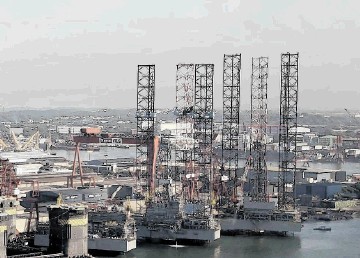
No orders have been placed for new drilling rigs so far this year, though the boom for yards is far from over due to their massive collective backlog built up in recent years.
RS Platou drilling analysts say that order books as “still apparently solid”, though neither the yards nor drilling equipment manufacturers are likely to be as “comfortable as their order-books indicate”.
“Yards will be questioning whether their order-books are large enough to bridge the current down-cycle,” say the analysts.
“According to current order-book (before delays) 81% of units will be delivered in 2015 and 2016.
“Further breakdown of the order-book shows 85% of the jack-up orders and 78% of the floater orders, excluding Petrobras domestic new-builds, will be delivered in the corresponding years.
“There is therefore some urgency required in attracting new orders before the majority of the order-book is delivered.
“The urgency is also higher at yards, where there is higher probability of contractors walking away from commitments due to tail-heavy instalments.”
RS Platou’s drilling analysts say that one way of attracting new orders is to cut the prices of new rigs to reflect the new trading environment.
While this may help, new orders follow to a large degree the profitability of the underlying industry, which will in the case of MODUs (mobile offshore drilling units) in all likelihood be challenged at least through 2016/17.
Furthermore, new-build prices of MODUs are likely to be “sticky”, they say. And, although steel prices have dropped lately, the actual steel content of rigs is considered to be relatively small.
“Equipment manufacturers’ margins have the potential to be pressured if their backlogs drop as expected, but these companies are also exposed towards other industries which have more favourable outlooks,” suggest the analysts.
“Also it is important to note that the margins of many yards are already pressured.”
The analysts suggest that the “saving grace” of the yards could be new orders for other types of assets though this is not explained.
“Oil and gas companies are currently of course undergoing a form of catharsis and sanctioning of new projects will rather decline than rise, implying competition for new projects will be tough.
“The projects that may receive some attention are units with technology that could help reduce the costs of oil and gas companies, but these are limited in number.
“As the rest of the oil and gas industry, yards and equipment manufacturers are already facing some tough choices.”
Meanwhile, the number of drilling companies committing to scrapping older rigs appears to be on the rise, with Transocean stating recently that it intends to take out further units, bringing the company’s apparent disposals list to 18 rigs. The further four are: Deepwater Expedition, Transocean Legend, Transocean Rather, and GSF Arctic III.
The last named has been in the North Sea for a long time and is currently stacked in the Cromarty Firth. Transocean Rather, formerly Sonat Rather, was built in the 1980s and is an early example of a fourth generation semi-submersible. It worked in the UK sector for a time, including drilling in the West of Shetland sector.
The company is also stacking four ultra deepwater units: Discoverer Spirit, GSF Jack Ryan, Deepwater Discovery, and Deepwater Pathfinder.
Paragon Offshore is scrapping three units, previously cold stacked: Paragon MSS3 (semi-submersible), Paragon DPDS4 (drillship) and Paragon B153 (jack-up).
Like some other contractors, Transocean is also delaying delivery of a number of rigs, in this case five jack-ups currently on order at Keppel FELS will be delayed by around six months per unit.
Seadrill reports “Preliminary steps to delay deliveries have been taken in order to avoid taking delivery of a unit without a contract.”
For example, agreements have been reached with both Cosco and Dalian to delay delivery of the Sevan Developer and eight jack-up units. In the case of the Sevan Developer, delivery was initially delayed by 12 months with cancellation options at six-month intervals with the potential to delay delivery by up to 36 months. The agreement with Dalian extends delivery of eight jack-up units for a total of 44 months.
Seadrill is also delaying the two drillships on order with Samsung and the further pair placed with DSME. Both yards are in South Korea.
According to RS Platou, Northern Offshore is also exploring how to delay the two jack-ups it has on order with Cosco in China though this appears not to have been disclosed in the company’s most recent statement where it talks of delivery in 2016.
Recommended for you
